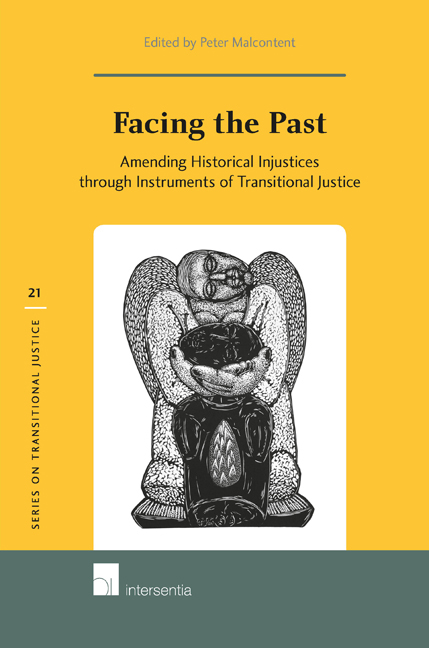Book contents
- Frontmatter
- Acknowledgements
- Contents
- PART I TRANSITIONAL JUSTICE. WHAT'S IN THE NAME?
- PART II RETRIBUTIVE JUSTICE
- PART III RESTORATIVE JUSTICE
- Introduction
- The Whole Truth and Nothing but the Truth? On the Role of Truth Commissions in Facing the Past
- Official Apologies
- Financial Compensation as a Political Process
- Education in the Shadow of History. Education, History Education, and Their Place in Historical Justice
- Governing through Repair. Historical Injustices and Indigenous Peoples in Canada
- PART IV PENDING CASES
- Author Information
Governing through Repair. Historical Injustices and Indigenous Peoples in Canada
from PART III - RESTORATIVE JUSTICE
Published online by Cambridge University Press: 15 December 2017
- Frontmatter
- Acknowledgements
- Contents
- PART I TRANSITIONAL JUSTICE. WHAT'S IN THE NAME?
- PART II RETRIBUTIVE JUSTICE
- PART III RESTORATIVE JUSTICE
- Introduction
- The Whole Truth and Nothing but the Truth? On the Role of Truth Commissions in Facing the Past
- Official Apologies
- Financial Compensation as a Political Process
- Education in the Shadow of History. Education, History Education, and Their Place in Historical Justice
- Governing through Repair. Historical Injustices and Indigenous Peoples in Canada
- PART IV PENDING CASES
- Author Information
Summary
INTRODUCTION
Facing the past in the context of settler colonialism presents a difficult challenge. Lacking a moment of rupture, such as the downfall of an authoritarian regime or the end of widespread violence, ‘transitional’ justice in settler societies is without a temporal focal point. There is no clear break with the past, which could potentially ignite new patterns of thought and action. Thus, historical justice in settler societies is hampered in its efforts to effect significant transformation because these societies are still embedded in colonial relations of rule.
This is the case in Canada, where a long history of trying to ‘deal’ with the ‘Indian problem’ has seen many promises of justice devolve into renewed attempts at assimilation.2 Rather than guide Canadian society toward an accommodation with indigenous peoples’ desire to fashion contemporary communities out of distinct cultural milieux, transitional justice in Canada often seeks to better fit these peoples into the Canadian mosaic. In this chapter, multiple forms of Canadian transitional repair are assessed: land claims negotiations, self governance provisions, compensation, and the Truth and Reconciliation Commission for former residential school students. In all cases, the constitutive dimension of the repair process is highlighted; that is, emphasis is placed on the ways in which repair is deployed to better manage and incorporate indigenous peoples within a settler national framework. This will be referred to as ‘governing through repair’, adapting Jonathan Simon's notion of ‘governing through crime’ to illustrate the ways in which repair processes contribute to a broader project of governance.3 In addition, I will argue that Canadian repair processes are in danger of replicating rather than transitioning from the historical injustices of assimilative policy-making, paternalistic disregard, and liberal governance that have long defined indigenous and non-indigenous relations in Canada.
GOVERNING THROUGH REPAIR
Governance, in Foucauldian terms, refers to more than just the attempt to direct the behaviour of a population; it notes the often more subtle strategies, discourses, and techniques through which individual and group conduct is shaped and regulated. Jonathan Simon's concept of governing through crime, for example, registers how contemporary governments use crime and the fear of crime to legitimate their authority.
- Type
- Chapter
- Information
- Facing the PastAmending Historical Injustices Through Instruments of Transitional Justice, pp. 303 - 320Publisher: IntersentiaPrint publication year: 2016
- 1
- Cited by



